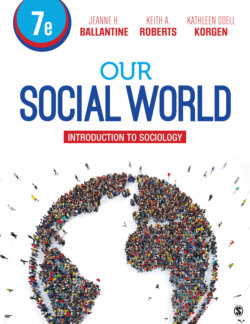Читать книгу Our Social World - Kathleen Odell Korgen - Страница 173
На сайте Литреса книга снята с продажи.
Key Points
ОглавлениеHuman beings come with their own biological makeup, but most of what makes us uniquely human we learn from our culture and society—through socialization. Humans who live in isolation from others do not receive the socialization necessary to be part of culture and are sometimes barely human.
The self consists of the interaction of the I—the basic impulsive human with drives, needs, and feelings—and the Me. We develop a reflective self through role-taking and seeing how others might view us.
The self is profoundly shaped by others, but it also has agency—that is, it can be an initiator of action and a maker of meaning.
The self develops through stages, from mimicking others (the play stage) to more intellectually sophisticated abilities such as role-taking and seeing how various roles complement each other (the game stage).
The self is modified as it moves through life stages, and some of those stages require major resocialization—shedding old roles and taking on new ones as one enters new statuses in life.
A number of agents of socialization are at work in each of our lives, communicating messages relevant at the micro, meso, or macro level of social life. At the meso level, for example, we may receive different messages about what it means to be a “good” person depending on our ethnic, religious, or social-class subculture.
Some of these messages may be in conflict with each other, as when global messages about tolerance for those who are different conflict with a nation’s desire to have absolute loyalty and a sense of being superior to other nations.
